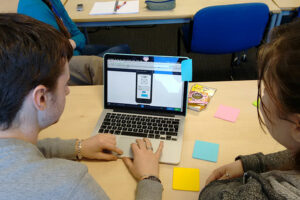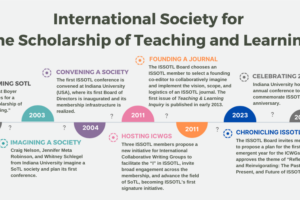
Call for Participants for 2023 International Collaborative Writing Groups (ICWG)
Applications are due March 24, 2023.
The International Society for the Scholarship of Teaching and Learning (ISSOTL) invites applications for group participants for the Academic track of its International Collaborative Writing Group (ICWG) initiative. Read more about this track on ISSOTL’s website.
We ICWG Co-Leaders are happy to invite applications for participants for the six groups based on the projects and facilitators we have selected. Below are brief descriptions of each of the six projects.
If any of these exciting projects sound interesting to you, please click here to apply to be a member of one of these groups. You will be asked to pick your top two projects, and members will be selected based on interest and an effort to create strong diverse teams.
Similar to the previous cohorts, these ICWGs will convene for a face-to-face/in-person working session on November 5-7, immediately prior to the ISSOTL23 conference in Utrecht, Netherlands. Before and after the conference, the groups will work together online to ultimately produce a publishable manuscript no later than October 2024. All ICWG leaders, group facilitators, and participants are expected to attend the pre-conference working session in person, to register for and attend the conference, and to be (or become) ISSOTL members. The ICWG registration fee was US$325 in 2022, and we expect it will be about the same for 2023.
Project descriptions:
Relationship Matters: Fostering Sustainable Pedagogical Practices
Group Lead: Nira Rahman, University of Melbourne
Acknowledging, understanding and connecting student backgrounds, learning abilities and aspirations is central to developing meaningful co-created partnerships and empowering students to engage and take agency in pedagogical practice. Institutions must provide pathways to foster ‘relationship matters’ attitudes for students to identify, develop and access support networks throughout their academic journey. This ICWG will investigate the influence of co-created partnerships on academic achievements, retention and graduation; further on building personal and social networks within and beyond academic institutions. This also aims to develop pragmatic strategies and materials connecting literature and new ideas to empower students in teaching and learning settings.
SoTL in an Artificially Intelligent World
Group Lead: Jennie Mills, University of Warwick
ChatGPT and AI have brought awe, wonder, and anxiety, and raise big questions about the future of teaching, learning, assessment, and higher education.
Using creative approaches to explore reflection and meaning-making, this project will consider:
- How AI will change SoTL?
- What makes SoTL uniquely ‘human’?
- How can SoTL methodologies, philosophies, and values help us to find what matters?
- How can we use SoTL to adapt to change and to navigate an artificially intelligent world?
SoTL as Inclusive Transdisciplinary Practice
Group Lead: Sara Nasrollahian Mojarad, University of Iowa & Anna Santucci, University College Cork
In a moment in which our field is increasingly taking a critical look at itself linguistic and epistemic justice, exploring the potential and implications of fostering a multidisciplinary approach to SoTL could help transform this field. Join us in this collaborative writing group to co-construct a framework to value and embrace SoTL as an inclusive and transdisciplinary field that perceives scholarship as both the process and outcome of the inquiry to teaching and learning.
How do we create environments where it is possible to admit our vulnerabilities and to open ourselves to learning?
Group Lead: Susan Moron-Garcia, Oxford Brookes University
Taking a critically reflective approach requires us to examine our certainties and “review our personal autobiographies as learners so that we can make visceral connections to, and gain a better understanding of, the pleasures and terrors our own students are experiencing.” (Brookfield, 2006, p.26) This can be risky and destabilising, but if we are to be systematic (Hutchings & Shulman 1999) and learners (Boyer 1990) alongside our students (Fenton 2013) it must be done.
Exploring SoTL Leadership: Building Networks and Career Paths
Group Lead: Melanie Hamilton, University of Saskatchewan
Our ICWG will discuss the sub-theme “leadership matters” by focusing on how leadership is demonstrated in SoTL. We will explore ways to grow SoTL at the micro, meso, macro, and mega levels. We will examine how SoTL scholars can develop career path in SoTL (both in formal and informal roles). We will also respond to Simmons and Taylor’s (2019) call to continue building SoTL leadership networks. Questions the group will consider include describing oneself as a SoTL leader and responsibilities or SoTL Leaders.
Expectations Matter: How we define & develop them and how we know they’ve been met
Group Lead: Mayi Arcellana-Panlilio, University of Calgary
What should our students learn? And how do we know that we’ve succeeded? Course expectations often focus on cognitive, content-based outcomes, and students show achieving these through various assessments. However, we want more for and of our students, and we need to make these implicit objectives visible. This group will explore articulating those affective outcomes that foster the values and attitudes of a person who can function and contribute in the real world.
If you have any questions, please reach out to any member of the ICWG team.
Earle Abrahamson (e.abrahamson@herts.ac.uk)
Barbara Kensington-Miller (b.kensington-miller@auckland.ac.nz)
Andrea Webb (andrea.webb@ubc.ca)
ICWG-Academic 2023 Co-Leaders




